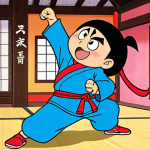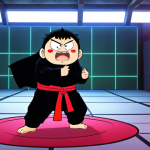You know Himawari, right? That adorable, mischievous little force of nature from Crayon Shin-chan with an uncanny knack for spotting anything shiny or any handsome man from a mile away.
It’s wild to think about, but her pure, unadulterated instinct for what she desires – be it a glittering bauble or a charming face – often makes me pause and reflect.
In our hyper-connected, data-driven world, where every decision is supposedly rationalized by algorithms and metrics, Himawari’s simple, undeniable pull towards ‘value’ feels almost revolutionary.
We, as adults, often talk about “gut feelings” or “instinctive reactions,” but how much do we truly listen to them anymore? It seems we’re constantly bombarded with information, leading to what some call “analysis paralysis” or, humorously, a grown-up version of “shiny object syndrome” when we chase every new tech trend or fleeting investment opportunity.
When I look at the current landscape, from the explosion of AI-driven tools promising instant success to the relentless pursuit of the ‘next big thing’ in everything from fashion to finance, it makes me wonder if we’ve lost touch with that raw, innocent intuition Himawari so effortlessly embodies.
Are we, in our quest for optimization, overlooking the simpler, more profound signals our inner selves are sending? It makes you wonder what truly guides us when the digital noise gets overwhelming.
Perhaps, as AI becomes increasingly sophisticated in processing vast amounts of data, the uniquely human capacity for pure intuition, empathy, and discerning true value—Himawari’s innate talent, if you will—will become an even more prized asset.
It’s a fascinating thought, isn’t it? Let’s delve deeper into this intriguing connection.
It’s a truly thought-provoking connection, isn’t it? That raw, unfiltered desire Himawari exhibits, pulling her relentlessly towards what she innately perceives as valuable, stands in stark contrast to the way many of us navigate our complex adult lives.
We’re constantly bombarded by data, expert opinions, and trend forecasts, often pushing that quiet inner voice, that gut feeling, further and further into the background.
But what if, in our relentless pursuit of optimization and rationalization, we’ve actually sidelined one of our most potent decision-making assets?
The Erosion of Intuition in a Hyper-Connected World

In the current digital age, where every click is tracked, every preference analyzed, and every decision seems to be a product of an algorithm or a spreadsheet, I’ve personally observed a growing disconnect from our inherent intuitive capabilities.
It feels as if we’re being conditioned to outsource our internal compass to external metrics. We’re told to “trust the data,” “follow the analytics,” and “optimize for engagement,” and while these are undeniably crucial for success in many fields, they can inadvertently dull our capacity to simply *feel* our way through certain choices.
I often catch myself second-guessing a perfectly valid instinct because it lacks a clear data point to back it up, as if a feeling isn’t a valid form of intelligence in itself.
It’s a subtle but pervasive shift that I believe is costing us more than we realize, leading to a pervasive sense of overwhelm rather than clarity.
1. The Pitfalls of Over-Analysis and Information Overload
From my own experience, getting lost in the weeds of over-analysis is a very real danger. I remember countless times sitting in front of a screen, an overwhelming amount of information laid out before me – market trends, competitor analysis, user feedback – and feeling utterly paralyzed.
This isn’t just “analysis paralysis”; it’s a form of decision fatigue brought on by an endless stream of data, much of which might be contradictory or irrelevant to the core issue.
Instead of leading to clarity, it often leads to a muddled mess, making it harder to distinguish meaningful signals from noise. It’s like trying to navigate a dense fog with a hundred different maps, each pointing in a slightly different direction, instead of just using your own internal compass to guide you.
This relentless influx of information can drown out the quieter, more subtle cues that our intuition provides, cues that often hold surprisingly profound insights.
We become so focused on collecting more data that we forget to process what’s already inside us.
2. The Loss of Spontaneity and Genuine Connection
This over-reliance on external validation doesn’t just affect our business decisions; it subtly seeps into our personal lives, too. I’ve noticed it in how people plan their vacations based purely on aggregated reviews, or even choose a restaurant because it’s “trending” rather than because it genuinely appeals to their senses.
The joy of spontaneity, of simply following a whim or a hunch, seems to diminish. We’re so busy optimizing for the “best” experience that we often miss out on the uniquely personal and unexpected ones.
Think about it: Himawari doesn’t check reviews before chasing a shiny object; she just *goes*. This unadulterated pursuit of desire, unburdened by external validation, is something we could all learn from, reminding us to sometimes trust our immediate feelings about what genuinely resonates with us, whether it’s a new hobby, a travel destination, or even a new friendship.
Embracing Your Inner Himawari: Reclaiming Instinctive Insights
So, how do we begin to reclaim this often-neglected part of ourselves? It’s not about abandoning data entirely – that would be foolish in our modern landscape – but rather about re-establishing a healthier balance.
I’ve found that cultivating a deeper awareness of my own internal states, paying attention to those subtle shifts in feeling or immediate impressions, has been transformative.
It’s about creating space for that intuitive voice to surface, acknowledging that sometimes, the ‘right’ answer isn’t something that can be neatly graphed or quantified.
For me, this often involves stepping away from the screen, taking a walk, or simply sitting in quiet contemplation. It’s during these moments that fragmented thoughts coalesce, and a clearer sense of direction often emerges, a feeling that I simply couldn’t derive from staring at a dashboard.
1. Recognizing the Subtle Signals Your Body Sends
Our bodies are incredibly intelligent, often processing information and sending us signals long before our conscious minds catch up. I’ve learned to pay attention to physical sensations: that sudden knot in my stomach when something feels off, or the lightness in my chest when I’m on the right track.
These aren’t just random physical reactions; they’re often sophisticated intuitive cues. For example, when evaluating a potential partnership, if I find myself feeling inexplicably tense or my energy levels dip, it’s a huge red flag for me, regardless of how good the numbers look on paper.
It’s about developing what I like to call “somatic intelligence” – understanding the language of your body as a guide. It takes practice, but once you start listening, you’ll be amazed at how clearly your body communicates with you.
2. Practical Steps to Tune In and Trust Your Gut
To truly embrace this intuitive side, I’ve found a few practical steps incredibly helpful:
- Mindful Pauses: Before making a significant decision, take a deep breath and pause. Ask yourself, “What does my gut tell me?” Don’t intellectualize; just listen for the immediate response. It’s often the very first thought or feeling that holds the most truth.
- Journaling Without Judgment: Free-form journaling can unlock intuitive insights. Just write whatever comes to mind, without editing or censoring. You might be surprised by the patterns or solutions that emerge from your subconscious.
- Reflect on Past “Gut Feelings”: Think back to times when your intuition served you well (or when ignoring it led to regrets). This builds confidence in your inner wisdom over time. I’ve done this exercise countless times, and each time, it reinforces my belief in the power of my gut.
- Limit Information Overload: Sometimes, less is truly more. Don’t drown yourself in endless research. Gather enough data to be informed, then give your intuition space to synthesize and react.
Intuition’s Untapped Potential in Business and Innovation
It might sound counter-intuitive, especially in the corporate world, but I firmly believe that some of the most groundbreaking innovations and strategic pivots have come from a profound intuitive leap rather than just a purely analytical one.
Think about the visionary leaders who launched products or services that no market research could have predicted would succeed, or the entrepreneurs who saw an opportunity where data only showed risk.
They often describe it as a “hunch” or a “feeling” that simply had to be pursued. This isn’t recklessness; it’s a sophisticated form of pattern recognition and foresight, honed by years of experience and an acute sensitivity to subtle market shifts or human needs.
It’s the ability to connect disparate dots that purely logical frameworks might miss, leading to truly novel solutions.
1. The Edge of “Gut Feel” in Strategic Decisions
In my career, I’ve observed that the most effective strategic decisions often involve a blend of robust data analysis and a strong intuitive conviction.
While data provides the ‘what,’ intuition often whispers the ‘why’ and the ‘how,’ especially when dealing with complex, ambiguous situations that don’t fit neatly into a spreadsheet.
When I’m faced with a strategic dilemma, I gather all the available information, analyze it thoroughly, and then, crucially, I step back and ask myself how I truly *feel* about the different options.
Does one option resonate more deeply? Does another create a subtle unease? This gut check acts as a powerful filter, helping to cut through the noise and highlight the path that feels most aligned, even if it’s not the most obvious one on paper.
It’s a powerful differentiator in a world where everyone has access to similar data sets.
2. Case Studies: When Instinct Led to Breakthroughs
History is replete with examples of individuals whose intuitive leaps transformed industries. Think of Steve Jobs and his unwavering belief in the user experience of Apple products, or Oprah Winfrey’s ability to connect with an audience on a deeply emotional level, both driven by an innate understanding of human psychology and desire that went beyond focus groups.
I remember reading about a successful startup founder who decided to pivot their entire business model based on a strong intuitive feeling that their initial offering, while seemingly viable, wasn’t truly solving a fundamental pain point.
All their data pointed to slow but steady growth, yet their gut screamed for a radical shift. They took the leap, against expert advice, and that pivot led to exponential growth.
These stories aren’t outliers; they highlight the profound impact of trusting that inner voice when facing uncharted territory.
The Symbiotic Dance: Where Data Meets Instinct
The beauty of modern decision-making lies not in choosing between intuition and data, but in understanding how they can dance together in a powerful, symbiotic relationship.
I often view data as the flashlight that illuminates the path, while intuition is the compass that tells me which direction to head in the first place.
You wouldn’t want to navigate a dark forest with just a compass, nor would you want to wander aimlessly with only a flashlight. The most successful outcomes, in my experience, emerge when these two forces are leveraged in harmony.
Data can validate or challenge an initial hunch, providing the evidence needed to move forward confidently, while intuition can highlight anomalies in the data or point towards entirely new avenues that the data alone might not reveal.
1. Leveraging Data to Validate and Refine Intuition
I’ve learned that my initial intuitive nudges, while powerful, aren’t always 100% accurate. This is where data becomes an invaluable ally. When I get a strong feeling about a particular strategy or opportunity, my next step is always to seek out data that can either support or refute that feeling.
For example, if I have a hunch that a certain content topic will resonate deeply with my audience, I won’t just publish it blindly. I’ll quickly check existing keyword data, analyze competitor content, and review past performance of similar topics.
If the data aligns, it reinforces my intuition, giving me the confidence to move full steam ahead. If it doesn’t, it prompts me to refine my approach or question my initial assumption, preventing potential missteps.
It’s a dynamic interplay, where each informs and strengthens the other.
2. Preventing “Analysis Paralysis” with a Gut Check
I know I mentioned analysis paralysis earlier, and it’s a recurring challenge for many of us. This is precisely where a well-trained intuition can serve as your personal antidote.
When you’re drowning in data and can’t seem to make a decision, a quick gut check can often unblock the process. Instead of continuing to scroll through endless reports, I’ll close my laptop, take a few deep breaths, and ask myself, “Which option simply feels *right* at this moment, given everything I know?” This isn’t about ignoring the data, but about using your intuition to synthesize it and cut through the indecision.
It allows you to move from a state of overwhelm to a state of decisive action, often revealing a path forward that feels genuinely aligned, even if it’s a slightly uncomfortable one.
| Decision Aspect | Intuition-Driven Approach | Data-Driven Approach |
|---|---|---|
| Source of Insight | Internal feelings, hunches, patterns recognized subconsciously, accumulated experience | External facts, statistics, reports, quantitative analysis, market trends |
| Speed of Decision | Often rapid, immediate “aha!” moments, especially in novel situations | Can be slower, requiring time for data collection, analysis, and interpretation |
| Risk Factors | Subject to personal bias, can be harder to justify to others, might miss objective facts | Risk of missing nuance, over-relying on past trends, can stifle creativity, analysis paralysis |
| Best Use Cases | Visionary leadership, creative problem-solving, interpersonal dynamics, navigating ambiguity, personal choices, exploring new frontiers | Optimization, performance monitoring, process improvement, identifying trends in established markets, reducing obvious errors |
| Complementary Role | Guides initial direction, fills gaps in data, sparks innovative ideas, synthesizes complex info | Validates hunches, identifies specific opportunities/threats, provides objective evidence, reduces uncertainty |
Cultivating an Intuitive Mindset for Everyday Life
It’s easy to talk about intuition in grand terms of business strategy or innovation, but its real power lies in its applicability to our everyday lives.
From choosing a new apartment to deciding which project to tackle first in your workday, a well-tuned intuitive mindset can significantly reduce stress and improve the quality of your decisions.
I’ve noticed that when I operate from a place of intuition, my energy feels more aligned, and my actions feel less forced. It’s not about being flaky or illogical; it’s about acknowledging that sometimes, the subtle signals our inner selves send are just as valid, if not more so, than the loudest voices from external sources.
It’s about building a life that truly resonates with your deepest desires, much like Himawari’s unwavering pursuit of that glittering object.
1. Mindfulness and Self-Awareness as Foundations
The cornerstone of cultivating a strong intuitive sense is undoubtedly mindfulness and self-awareness. You can’t hear your inner voice if you’re constantly distracted or living on autopilot.
For me, this means regularly practicing mindfulness – whether through meditation, a quiet walk, or simply paying attention to my breath throughout the day.
It’s about creating moments of stillness where I can truly observe my thoughts, feelings, and physical sensations without judgment. This practice has significantly enhanced my ability to discern between genuine intuitive nudges and mere anxieties or wishful thinking.
The more aware I become of my internal landscape, the clearer the intuitive signals become, making it easier to trust them when they appear.
2. Learning from Mistakes and Trusting the Process
Just like any other skill, developing intuition requires practice, patience, and a willingness to learn from your missteps. There will be times when your intuition leads you down a path that doesn’t yield the immediate results you hoped for, or even makes you question your judgment.
I’ve certainly had those moments! The key isn’t to abandon intuition altogether, but to reflect on what happened. Was it truly intuition, or was it fear or desire in disguise?
What felt off? These reflections are invaluable learning opportunities. Over time, you’ll start to recognize the distinct “flavor” of your authentic intuition, and the more you act on it (and reflect on the outcomes), the stronger and more reliable it becomes.
It’s a journey of self-discovery and a lifelong commitment to trusting yourself.
The Long Game: Building a Life Guided by Authentic Wisdom
Ultimately, integrating intuition into our lives isn’t just about making better individual decisions; it’s about shaping a life that feels genuinely authentic and deeply fulfilling.
When you consistently tap into that inner wellspring of wisdom, you start to navigate the world with a quiet confidence that is truly empowering. You become less swayed by external pressures, fleeting trends, or the opinions of others, because you have a stronger sense of your own true north.
It’s a profound shift from a reactive existence – constantly responding to external stimuli – to a proactive one, where your choices are driven by an inner knowing and a clearer sense of purpose.
This is the enduring legacy of embracing your inner Himawari: not just spotting the shiny objects, but understanding what truly sparkles for *you* in the long run.
1. Personal Well-being and Authentic Connections
From my perspective, few things contribute more to personal well-being than living in alignment with your true self. When your decisions are intuitively guided, there’s a natural sense of flow and ease that permeates your life.
You find yourself drawn to people, opportunities, and environments that genuinely nourish you, while instinctively pulling away from those that drain your energy.
This creates more authentic relationships and a stronger sense of inner peace. I’ve personally experienced how trusting my gut about certain friendships or career paths has led to deeper satisfaction than any meticulously planned spreadsheet ever could.
It’s about creating a life that feels less like a performance and more like a genuine expression of who you are.
2. Navigating Uncertainty with Quiet Confidence
Perhaps the most crucial benefit of developing a strong intuitive sense is the ability to navigate uncertainty with a quiet, unwavering confidence. In a world that seems to be in a constant state of flux, relying solely on past data or predictable patterns can leave you feeling vulnerable and ill-equipped for the unexpected.
Intuition, however, thrives in ambiguity. It allows you to sense underlying currents, anticipate shifts, and make swift, adaptive decisions even when all the facts aren’t yet available.
It’s like having an internal radar that picks up signals others might miss, giving you an edge in adapting to unforeseen challenges. This isn’t about having all the answers; it’s about trusting your capacity to find the right path, even when the fog rolls in, knowing that your inner wisdom is a powerful, ever-present guide.
Wrapping Up
As we navigate a world increasingly awash in data, the temptation to solely rely on external metrics can be overwhelming. Yet, by embracing our inner Himawari, that innate drive towards what truly resonates, we unlock a powerful, often overlooked asset: our intuition. It’s about finding that sweet spot where logical analysis and instinctive wisdom dance together, creating a richer, more authentic path forward in both our personal and professional lives. Trusting that quiet inner voice isn’t a sign of weakness; it’s a profound act of self-reliance, leading us towards decisions that feel genuinely right, not just statistically sound.
Helpful Information
1. Intuition isn’t mysticism; it’s often your subconscious mind rapidly processing vast amounts of information and experiences, offering a distilled insight.
2. View data as a flashlight illuminating the path ahead, and intuition as the compass telling you which general direction to walk in the first place.
3. Regular mindfulness practices, like meditation or simply taking quiet pauses, are crucial for tuning into your subtle intuitive signals amidst daily noise.
4. Start small: practice trusting your gut with minor decisions and observe the outcomes. This builds confidence in your inner wisdom over time.
5. Remember, cultivating intuition is a lifelong journey of self-discovery and trust, not a skill you master overnight. Be patient and compassionate with yourself.
Key Takeaways
To truly thrive, balance data with intuition. Over-analysis and information overload can erode our innate intuitive capabilities, leading to decision fatigue and missed opportunities for spontaneity and genuine connection.
Embrace your inner instinct by recognizing subtle body signals and practicing mindful pauses, journaling, and reflecting on past “gut feelings.” In business, intuition provides an edge in strategic decisions and sparks innovation, as seen in numerous success stories where instinct led to breakthroughs.
The most effective approach lies in the symbiotic dance between data and intuition: using data to validate and refine hunches, and employing intuition to prevent analysis paralysis.
Cultivating this intuitive mindset in everyday life, through mindfulness and learning from mistakes, leads to greater personal well-being, authentic connections, and the quiet confidence needed to navigate an uncertain world, building a life guided by authentic wisdom.
Frequently Asked Questions (FAQ) 📖
Q: In a world seemingly run by algorithms, how can someone, like me, start to trust their “Himawari-sense” again – that pure, unadulterated instinct for what truly matters?
A: Oh, trust me, I’ve been there. Drowning in data, endlessly scrolling through reviews, paralyzed by too many “best of” lists for something as simple as a new coffee maker.
It’s absolutely exhausting. What I’ve genuinely found helps – and this sounds almost too simple – is creating intentional pockets of nothingness. No phone, no news, just… space.
For me, it’s a quick walk without headphones, or even just staring out the window with a cup of tea. It’s during these quiet moments, when the digital noise isn’t pounding at my senses, that those little nudges, those “gut feelings,” actually get a chance to surface.
It’s like clearing out a cluttered room; suddenly, you can actually see what’s been hiding under the piles. I started by applying this to small decisions – like what to cook for dinner, or which book to pick up – and slowly, that muscle, that intuition, started to flex again.
It’s less about ignoring data entirely, and more about letting your own inner compass calibrate before the algorithms shout directions at you.
Q: We’re constantly chasing the ‘next big thing’ – be it a new crypto or the latest productivity app. What’s the real danger, from your perspective, in letting that “grown-up shiny object syndrome” guide our decisions?
A: That’s a tough one, because I’ve certainly fallen victim to it myself! Remember the NFT craze? Or that one “revolutionary” app that promised to organize my entire life but just ended up being another icon on my home screen?
The real danger, as I see it, isn’t just the wasted money or time – though goodness knows I’ve felt the sting of a regrettable investment. It’s the constant state of dissatisfaction and the erosion of genuine purpose.
When we’re perpetually chasing the next shiny object, we lose sight of what we already have, and more importantly, what we truly value. It creates this restless energy, a feeling that you’re always just one step behind, never quite enough.
It’s like being stuck on a treadmill, running hard but never actually getting anywhere meaningful. My experience has shown me that the truly impactful changes, whether in my career or my personal life, almost never came from chasing the fleeting trend.
They came from a deep, sometimes quiet, conviction about what truly resonated with my long-term goals, not what was screaming at me from a banner ad.
Q: As
A: I gets scarily good at processing data, do you genuinely believe our unique human intuition, that “Himawari-like talent,” will truly become a more prized asset, or will it just get drowned out by the noise?
A3: This is the question that keeps me up at night, in the best possible way! Honestly, I’m leaning towards it becoming an incredibly prized asset, perhaps even the defining human advantage.
Think about it: AI can sift through unimaginable amounts of data, spot patterns, and even generate incredibly sophisticated content. But what it can’t do, not authentically anyway, is feel a nuance, discern true human desire beyond metrics, or have that raw, visceral understanding of what truly brings joy or meaning.
That’s Himawari’s superpower, right? Her unerring ability to spot a genuinely handsome man or a glittering gem, not because she ran an algorithm on their statistical appeal, but because it just is.
In a world drowning in AI-generated “perfection,” the ability to possess that rare, genuine discernment – to know what feels right, what truly connects, what has enduring value beyond its current trend cycle – will be gold.
It’s what differentiates a true artist from a prompt engineer, a visionary leader from a data analyst, or even a truly great friend from a well-programmed chatbot.
It’s the unique human spark, and I believe it’s only going to shine brighter.
📚 References
Wikipedia Encyclopedia
구글 검색 결과
구글 검색 결과
구글 검색 결과
구글 검색 결과
구글 검색 결과



